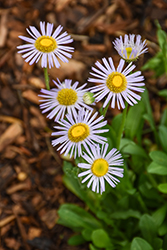It's all about ...
plants

Height: 18 inches
Spread: 18 inches
Sunlight:
![]()
![]()
Hardiness Zone: 3b
Description:
Delicate semi-double daisy-like flowers range from white to pink and lavender to blue; prefers moist soils around stream banks, bogs or meadows; attracts native butterflies; this variety blooms profusely all summer; great for naturalizing
Ornamental Features
Wandering Fleabane has masses of beautiful white daisy flowers with lavender overtones and yellow eyes at the ends of the stems from early to mid summer, which are most effective when planted in groupings. The flowers are excellent for cutting. Its narrow leaves remain green in colour throughout the season.
Landscape Attributes
Wandering Fleabane is an herbaceous perennial with a ground-hugging habit of growth. Its medium texture blends into the garden, but can always be balanced by a couple of finer or coarser plants for an effective composition.
This is a relatively low maintenance plant, and should not require much pruning, except when necessary, such as to remove dieback. It is a good choice for attracting bees and butterflies to your yard, but is not particularly attractive to deer who tend to leave it alone in favor of tastier treats. Gardeners should be aware of the following characteristic(s) that may warrant special consideration;
- Spreading
Wandering Fleabane is recommended for the following landscape applications;
- Mass Planting
- Border Edging
- General Garden Use
- Naturalizing And Woodland Gardens
Planting & Growing
Wandering Fleabane will grow to be about 18 inches tall at maturity, with a spread of 18 inches. It grows at a fast rate, and under ideal conditions can be expected to live for approximately 10 years. As an herbaceous perennial, this plant will usually die back to the crown each winter, and will regrow from the base each spring. Be careful not to disturb the crown in late winter when it may not be readily seen!
This plant does best in full sun to partial shade. It does best in average to evenly moist conditions, but will not tolerate standing water. This plant does not require much in the way of fertilizing once established. It is not particular as to soil pH, but grows best in poor soils. It is somewhat tolerant of urban pollution. This species is native to parts of North America. It can be propagated by division.
This plant is not reliably hardy in our region, and certain restrictions may apply; contact the store for more information.
